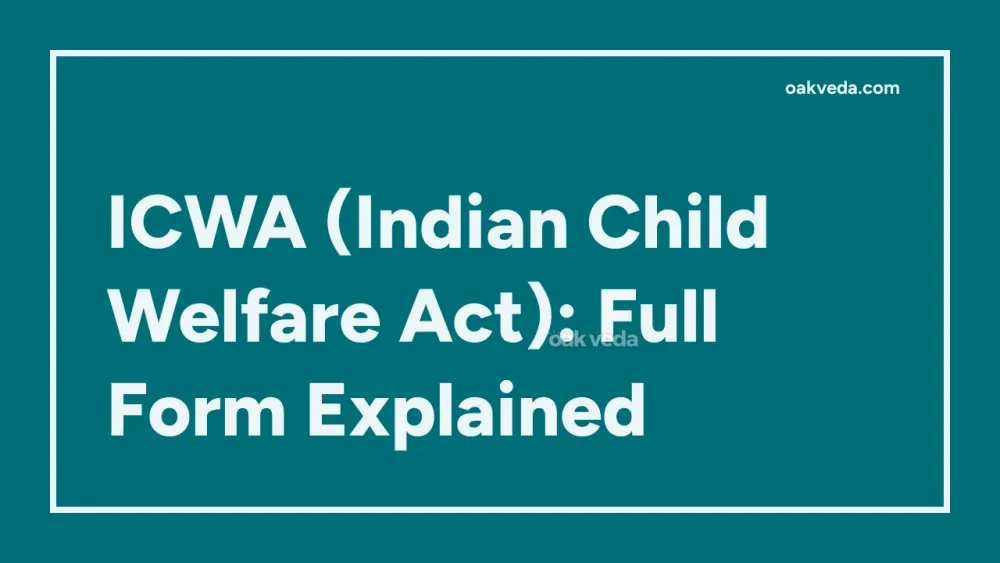
What is the Full Form of ICWA?
ICWA is the acronym for the Indian Child Welfare Act. This federal law plays a crucial role in protecting the rights and welfare of Native American children in the United States.
What is Indian Child Welfare Act?
The Indian Child Welfare Act is a landmark piece of legislation enacted in 1978 by the United States Congress. Its primary purpose is to safeguard the best interests of Native American children and promote the stability and security of Indian tribes and families.
Origin and Development of Indian Child Welfare Act
The ICWA was born out of a pressing need to address the alarmingly high rates of Native American children being removed from their families and communities. Prior to its enactment, an estimated 25-35% of Native American children were being separated from their families by state child welfare and private adoption agencies.
This widespread practice led to the erosion of Native American cultures and identities, as children were often placed in non-Native homes, far removed from their heritage. The Act was developed as a response to this crisis, aiming to preserve Native American families and tribal connections.
How does Indian Child Welfare Act work?
The ICWA establishes federal standards for the removal and placement of Native American children in foster or adoptive homes. It gives tribal governments a strong voice in child custody proceedings involving Native American children. Key provisions of the Act include:
- Prioritizing placement with extended family members
- Favoring placement within the child's tribe if family placement is not possible
- Requiring active efforts to prevent the breakup of Indian families
- Mandating higher standards of evidence for terminating parental rights
Functions of Indian Child Welfare Act
The primary functions of the ICWA are:
- Protecting Native American children: By ensuring their cultural connections are maintained even in cases of adoption or foster care.
- Preserving tribal integrity: By keeping Native American children within their communities whenever possible.
- Promoting cultural continuity: By prioritizing placements that allow children to maintain ties to their heritage.
- Empowering tribal courts: By giving them jurisdiction in certain child custody cases involving tribal members.
Applications of Indian Child Welfare Act
The ICWA applies to a wide range of child custody proceedings involving Native American children, including:
- Foster care placements
- Termination of parental rights
- Pre-adoptive placements
- Adoptive placements
It's important to note that the Act does not apply to custody disputes between parents in divorce proceedings or to juvenile delinquency cases.
Features of Indian Child Welfare Act
Key features of the ICWA include:
- Tribal jurisdiction: Recognizes tribal courts as the preferred forum for Native American child custody cases.
- Notice requirements: Mandates that tribes be notified of state court proceedings involving their children.
- Intervention rights: Allows tribes to intervene in state court proceedings.
- Placement preferences: Establishes a hierarchy of preferred placements for Native American children.
- Active efforts: Requires states to make active efforts to prevent the breakup of Indian families.
Benefits of Indian Child Welfare Act
The ICWA has brought about numerous benefits:
- Cultural preservation: Helps maintain Native American cultural identities and traditions.
- Family unity: Reduces unnecessary removals of Native American children from their families.
- Tribal sovereignty: Strengthens tribal governments' role in child welfare decisions.
- Improved outcomes: Research suggests Native American children placed according to ICWA guidelines have better long-term outcomes.
Limitations or Challenges of Indian Child Welfare Act
Despite its importance, the ICWA faces several challenges:
- Implementation issues: Inconsistent application across states and agencies.
- Legal challenges: Ongoing debates about the Act's constitutionality.
- Resource constraints: Many tribes lack resources to fully participate in ICWA cases.
- Complexity: The Act's provisions can be complex, leading to misunderstandings.
Future Developments in Indian Child Welfare Act
The future of ICWA remains a topic of ongoing discussion and potential reform:
- Strengthening implementation: Efforts to improve consistent application across jurisdictions.
- Expanding resources: Initiatives to provide tribes with more resources for ICWA compliance.
- Legal clarifications: Potential amendments to address legal challenges and clarify provisions.
- Cultural competency training: Increased focus on training for non-Native child welfare workers.
FAQs on ICWA Full Form
-
What does ICWA stand for? ICWA stands for Indian Child Welfare Act.
-
When was the ICWA enacted? The Indian Child Welfare Act was enacted in 1978.
-
Who does the ICWA protect? The ICWA protects Native American children, families, and tribes.
-
Does ICWA apply to all custody cases involving Native American children? No, ICWA does not apply to custody disputes between parents or juvenile delinquency cases.
-
Can non-Native families adopt Native American children under ICWA? Yes, but ICWA prioritizes placement with family members or within the child's tribe when possible.
-
How does ICWA define an "Indian child"? An "Indian child" under ICWA is an unmarried person under 18 who is either a tribal member or eligible for membership and has a biological parent who is a tribal member.
-
What is the "active efforts" requirement in ICWA? "Active efforts" require state agencies to make affirmative, thorough, and timely efforts to keep Native families together or reunite them.
The Indian Child Welfare Act remains a vital piece of legislation, safeguarding the rights and cultural heritage of Native American children. While challenges persist, its importance in preserving Native American families and tribal communities cannot be overstated.
You may be interested in:
- CPU (Central Processing Unit): Full Form and Function
- ASEAN (Association of Southeast Asian Nations)
- CFT (Complement Fixation Test): Full Form Explained
- TT (Tetanus Toxoid): Full Form and Importance
- PNB (Punjab National Bank): Full Form and Overview
- BA (Bachelor of Arts): Full Form and Comprehensive Guide

